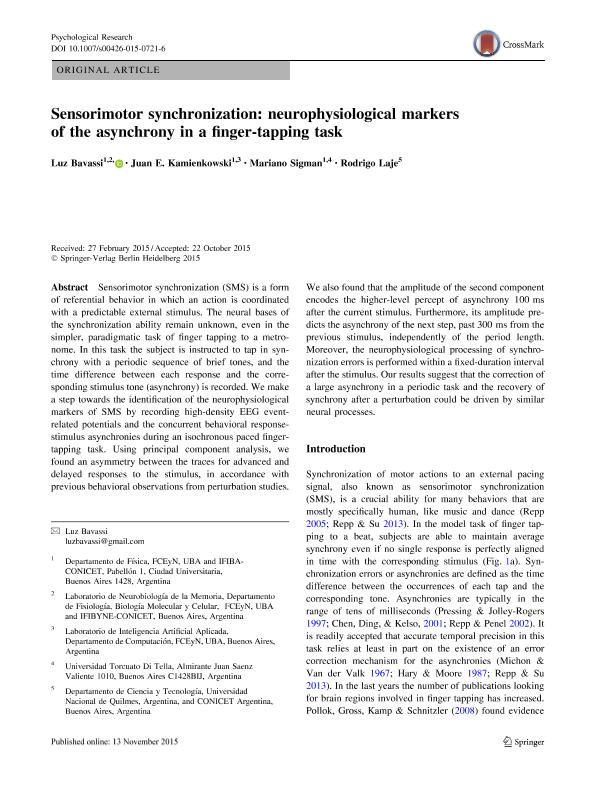Mostrar el registro sencillo del ítem
dc.contributor.author
Bavassi, Mariana Luz

dc.contributor.author
Kamienkowski, Juan Esteban

dc.contributor.author
Sigman, Mariano

dc.contributor.author
Laje, Rodrigo

dc.date.available
2019-09-27T22:27:49Z
dc.date.issued
2017-01
dc.identifier.citation
Bavassi, Mariana Luz; Kamienkowski, Juan Esteban; Sigman, Mariano; Laje, Rodrigo; Sensorimotor synchronization: neurophysiological markers of the asynchrony in a finger-tapping task; Springer Verlag Berlín; Psychological Research; 81; 1; 1-2017; 143-156
dc.identifier.issn
0340-0727
dc.identifier.uri
http://hdl.handle.net/11336/84756
dc.description.abstract
Sensorimotor synchronization (SMS) is a form of referential behavior in which an action is coordinated with a predictable external stimulus. The neural bases of the synchronization ability remain unknown, even in the simpler, paradigmatic task of finger tapping to a metronome. In this task the subject is instructed to tap in synchrony with a periodic sequence of brief tones, and the time difference between each response and the corresponding stimulus tone (asynchrony) is recorded. We make a step towards the identification of the neurophysiological markers of SMS by recording high-density EEG event-related potentials and the concurrent behavioral response-stimulus asynchronies during an isochronous paced finger-tapping task. Using principal component analysis, we found an asymmetry between the traces for advanced and delayed responses to the stimulus, in accordance with previous behavioral observations from perturbation studies. We also found that the amplitude of the second component encodes the higher-level percept of asynchrony 100 ms after the current stimulus. Furthermore, its amplitude predicts the asynchrony of the next step, past 300 ms from the previous stimulus, independently of the period length. Moreover, the neurophysiological processing of synchronization errors is performed within a fixed-duration interval after the stimulus. Our results suggest that the correction of a large asynchrony in a periodic task and the recovery of synchrony after a perturbation could be driven by similar neural processes.
dc.format
application/pdf
dc.language.iso
eng
dc.publisher
Springer Verlag Berlín

dc.rights
info:eu-repo/semantics/openAccess
dc.rights.uri
https://creativecommons.org/licenses/by-nc-sa/2.5/ar/
dc.subject
NEUROSCIENCE
dc.subject
SENSORIMOTOR SYNCHRONIZATION
dc.subject
FINGER TAPPING
dc.subject
EEG
dc.subject.classification
Otras Ciencias Biológicas

dc.subject.classification
Ciencias Biológicas

dc.subject.classification
CIENCIAS NATURALES Y EXACTAS

dc.title
Sensorimotor synchronization: neurophysiological markers of the asynchrony in a finger-tapping task
dc.type
info:eu-repo/semantics/article
dc.type
info:ar-repo/semantics/artículo
dc.type
info:eu-repo/semantics/publishedVersion
dc.date.updated
2019-09-26T17:09:19Z
dc.identifier.eissn
1430-2772
dc.journal.volume
81
dc.journal.number
1
dc.journal.pagination
143-156
dc.journal.pais
Alemania

dc.journal.ciudad
Berlín
dc.description.fil
Fil: Bavassi, Mariana Luz. Consejo Nacional de Investigaciones Científicas y Técnicas. Oficina de Coordinación Administrativa Ciudad Universitaria; Argentina. Universidad de Buenos Aires. Facultad de Ciencias Exactas y Naturales. Departamento de Física; Argentina. Universidad de Buenos Aires. Facultad de Ciencias Exactas y Naturales. Departamento de Fisiología, Biología Molecular y Celular; Argentina
dc.description.fil
Fil: Kamienkowski, Juan Esteban. Consejo Nacional de Investigaciones Científicas y Técnicas. Oficina de Coordinación Administrativa Ciudad Universitaria; Argentina. Universidad de Buenos Aires. Facultad de Ciencias Exactas y Naturales. Departamento de Física; Argentina. Universidad de Buenos Aires. Facultad de Ciencias Exactas y Naturales. Departamento de Computación. Laboratorio de Inteligencia Artificial Aplicada; Argentina
dc.description.fil
Fil: Sigman, Mariano. Consejo Nacional de Investigaciones Científicas y Técnicas. Oficina de Coordinación Administrativa Ciudad Universitaria; Argentina. Universidad de Buenos Aires. Facultad de Ciencias Exactas y Naturales. Departamento de Física; Argentina. Universidad Torcuato Di Tella; Argentina
dc.description.fil
Fil: Laje, Rodrigo. Consejo Nacional de Investigaciones Científicas y Técnicas; Argentina. Universidad Nacional de Quilmes. Departamento de Ciencia y Tecnología; Argentina
dc.journal.title
Psychological Research
dc.relation.alternativeid
info:eu-repo/semantics/altIdentifier/url/http://link.springer.com/article/10.1007/s00426-015-0721-6
dc.relation.alternativeid
info:eu-repo/semantics/altIdentifier/doi/http://dx.doi.org/10.1007/s00426-015-0721-6
Archivos asociados
